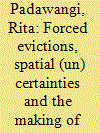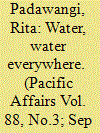|
|
|
Sort Order |
|
|
|
Items / Page
|
|
|
|
|
|
|
| Srl | Item |
| 1 |
ID:
190141


|
|
|
|
|
| Summary/Abstract |
Neighbourhoods are places of social encounters on a daily basis, but they are getting insufficient attention from policy makers and urban studies in conceptualising the city. While the city is often the unit of analysis and boundaries of data collection, social constructions of the city are mostly from neighbourhoods. By shifting the analysis to the neighbourhood scale, we are moving scholarship and research on two fronts. First, we need to think about city building knowledge at a pedagogical and methodological level. Second, we want to examine processes and amenity creation at the neighbourhood scale and make visible the ways these add to city politics, economy, and culture. Articles in this special issue contribute to urban scholarship in the following ways: (i) neighbourhood as a method of urban studies; (ii) understanding urban politics and government; (iii) the role of urban informality and small businesses; and (iv) the role of traditional neighbourhood institutions in the social life of the city. Neighbourhoods can be poorly resourced and inward-looking, but in many cases localised interests, relationships and organisations are capable of collective action, networking beyond their localities, and inspiring its residents with aspirations of the city's future directions.
|
|
|
|
|
|
|
|
|
|
|
|
|
|
|
|
| 2 |
ID:
164715


|
|
|
|
|
| Summary/Abstract |
This article considers the relationship between forced evictions and the ‘exemplary centre’ through an examination of three urban waterfront sites in Indonesia in comparative perspective. How is the notion of the ‘exemplary centre’ related to forced evictions and the aspirations of marginalised populations in contemporary cities of Indonesia? What are the chances of asserting alternative ideologies when a capital‐centric and modernist vision of the city as ‘exemplary centre’ dominates official planning paradigms? Competing visions of the ‘exemplary centre’ arise from distinct centres of power, from the state level to the grassroots community level; however, the dominant state vision of urban space is often internalised by those most at risk of displacement by modernist projects. Strategies to thwart forced evictions in riverbank settlements in Jakarta, Solo, and Surabaya offer alternative imaginings of the ‘exemplary centre’ – imaginings that enable the urban poor to visualise their hopes and to overcome the spatial uncertainties that characterise their everyday lives. While these efforts indicate resistance to marginalisation, they also provide a distinct kind of ‘exemplary’ vision based on residents’ own understanding of ideal city living. Concurrently, some alignment to existing ‘exemplary centre’ narratives is traceable in the effort to assert these alternatives.
|
|
|
|
|
|
|
|
|
|
|
|
|
|
|
|
| 3 |
ID:
140390


|
|
|
|
|
| Summary/Abstract |
Jakarta has entered an era of chronic flooding that is annually affecting tens of thousands of people, most of whom are crowded into low-income neighbourhoods in flood-prone areas of the city. As the greater Jakarta mega-urban region—Jabodetabek—approaches the 30 million population mark and the sources of flooding become ever more complex through combinations of global climate change and human transformations of the urban landscape, government responses to flooding pursued primarily through canal improvements fall further behind rising flood risks. Years of field observation, archival and ethnographic research are brought together in a political ecology framework to answer key questions concerning how government responses to flooding continue without significant participation of affected residents who are being compelled to relocate when floods occur. issue_image_88_3_PadawangiHow do urban development processes in Jakarta contribute to chronic flooding? How does flooding arise from and further generate compound disasters that cascade through Jakarta’s expanding mega-urban region? What is the potential for neighbourhoods and communities to collaboratively respond through socially and environmentally meaningful initiatives and activities to address chronic flooding? Floods, urban land use changes, spatial marginalization and community mobilization open new political dynamics and possibilities for addressing floods in ways that also assist neighbourhoods to gain resilience. The urgency of floods as problems to be solved is often interpreted as a need for immediate solutions, but flood-resilient communities are rooted in gains in resilience in non-emergency times by expanding rights to live in the city, to build houses and create vernacular communities by and for people
|
|
|
|
|
|
|
|
|
|
|
|
|
|
|
|
|
|
|
|
|